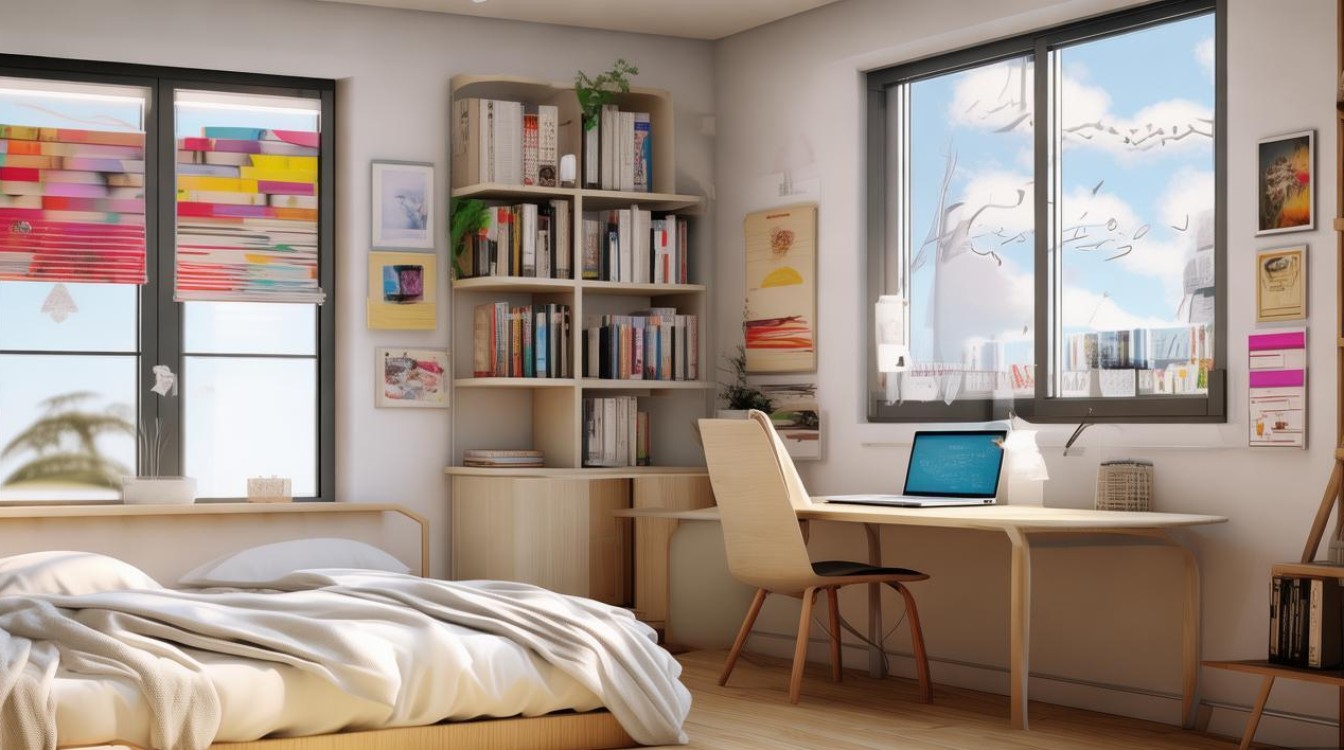在雅思口语考试中,“accommodation”(住宿)是一个高频且贴近生活的话题,不仅出现在Part 1的日常问答中,也可能在Part 2的个人经历描述或Part 3的社会讨论中延伸,无论是描述自己的居住环境,还是对比不同住宿方式的优劣,清晰的逻辑、丰富的细节和准确的表达都能帮助考生展现语言能力,以下从常见住宿类型、选择因素、相关话题拓展及实用表达四个维度,为大家系统梳理“accommodation”相关内容,助力口语备考。

常见住宿类型及特点
住宿方式多样,不同场景下的选择差异显著,了解各类住宿的特点,能在口语考试中灵活应对描述类问题。
租房(Renting a House/Apartment)
租房是学生和职场人士最常见的住宿方式,可分为整租(entire place)和合租(sharing with roommates)。
- 优点:空间相对独立,生活自由度高(如自主装修、安排作息),适合长期居住。
- 缺点:需承担租金、物业费等固定开支,可能面临房东涨租、合同纠纷等问题。
- 场景举例:描述大学期间的住宿时,可以说:“I shared a two-bedroom apartment with three classmates during my freshman year. We split the rent and utilities, which made it affordable.”
学生宿舍(Student Dormitory)
多提供给大学生,分为单人间(single room)和双人间(twin room),公共区域(如厨房、浴室)需共享。
- 优点:安全性高(有门禁管理),社交机会多(易认识同学),租金通常低于校外租房。
- 缺点:隐私性较差,需遵守宿舍管理规定(如熄灯时间、访客限制)。
- 场景举例:Part 2可能要求描述“a place you lived in”,可聚焦宿舍生活:“The dorm was small but well-equipped. We often gathered in the common room to study or watch movies, which created a strong sense of community.”
寄宿家庭(Homestay)
适合语言学习者或短期居住者,与当地家庭共同生活。
- 优点:沉浸式体验当地文化(如饮食、习俗),语言练习机会多,家庭氛围温暖。
- 缺点:需适应家庭规则(如作息、饮食偏好),个人空间有限。
- 场景举例:描述留学初期的经历:“Living with a host family helped me improve my English quickly. I learned to cook traditional British dishes and celebrated Christmas with them, which was unforgettable.”
酒店/短租(Hotel/Airbnb)
多用于短期旅行或临时过渡。
- 酒店:服务标准化(如每日清洁、前台咨询),价格较高,适合追求便利的旅客。
- 短租(如Airbnb):兼具居家感(可自己做饭),性价比高,但需注意房源真实性。
选择住宿的核心考量因素
在口语考试中,若被问及“如何选择住宿”或“理想的居住环境”,可从以下角度展开,体现逻辑性和辩证思维。
| 考量因素 | 具体说明 | 口语表达示例 |
|---|---|---|
| 预算(Budget) | 租金、水电费、物业费等总支出需不超过月收入的30%-40%,避免经济压力。 | “Budget is my top priority. I’d look for a place within 1500 RMB per month, including utilities.” |
| 地理位置(Location) | 距离学校/公司的通勤时间(理想为30分钟内),周边配套(超市、医院、地铁站)是否完善。 | “Good location is crucial. I prefer a place near a subway station and within walking distance of a supermarket.” |
| 居住环境(Environment) | 安全性(小区监控、邻里情况)、采光通风、隔音效果,以及周边是否安静。 | “I value a quiet neighborhood with good security. A balcony would be a bonus—I can grow plants there.” |
| 室友/房东关系(Relationships) | 合租需考虑室友的生活习惯(如作息、卫生);寄宿家庭则需看双方是否合得来。 | “If sharing with roommates, I hope they are tidy and respectful of each other’s schedules.” |
话题拓展与高频问题
围绕“accommodation”,雅思口语可能从个人经历延伸至社会现象,以下是Part 1-3的常见问题及回答思路。
Part 1:日常问答
-
Q: Do you live in a house or an apartment?
A: I live in a two-bedroom apartment with my family. It’s on the 10th floor of a high-rise building, so we have a great view of the city. Although the space is a bit limited, we’ve made it cozy with personal decorations. -
Q: What’s your favorite part of your home?
A: My favorite spot is the balcony. I grow some small plants there and often read books in the morning sunlight. It’s a peaceful escape from the busy city life.
Part 2:个人经历描述(Describe a type of accommodation you have lived in)
思路:明确住宿类型→描述外观/内部环境→居住经历→感受/影响。
参考回答:
“I’d like to talk about the student dormitory I lived in during my first year of university. It was a standard single room with a bed, a desk, and a wardrobe. The shared bathroom and kitchen were always busy, especially in the morning. What impressed me most was the sense of community—we often organized study groups in the common room or celebrated birthdays together. Living there taught me to be more considerate of others and manage my time efficiently, as we had to follow a quiet hours rule after 10 p.m. Overall, it was a challenging but memorable experience.”
Part 3:社会讨论
-
Q: Do you think young people prefer renting or buying a house today? Why?
A: Nowadays, many young people prefer renting rather than buying. First, house prices in big cities are extremely high, making it difficult for them to afford a down payment. Second, renting offers more flexibility—they can move closer to work or change neighborhoods easily. However, some still see buying a house as a symbol of stability, especially when they plan to start a family. -
Q: How has accommodation changed in your country over the past few decades?
A: Great changes have taken place. In the past, multi-generational families lived together in large houses, but now nuclear families are more common, and people prefer smaller apartments with better facilities. Also, there’s a growing trend of “co-living spaces” among young professionals, which provide shared work areas and social events to address loneliness in urban life.
实用表达与词汇积累
掌握地道表达能让口语回答更生动,以下是分类整理的高频词汇和句型。
住宿类型
- 独栋别墅(detached house)、联排别墅(terraced house)、公寓(apartment/flat)、单间(studio)、阁楼(loft)
设施与描述
- 配套设施(facilities)、采光(natural light)、隔音(soundproofing)、朝南(south-facing)、装修(furnished/unfurnished)
- 例句:“The apartment is fully furnished with a modern kitchen and air conditioning.”
动作与体验
- 搬家(move house)、付租金(pay rent)、签合同(sign a lease)、合租(share accommodation)、适应环境(settle in)
- 例句:“It took me about a week to settle into the new neighborhood.”
优缺点评价
- 便利(convenient)、拥挤(cramped)、安全(secure)、嘈杂(noisy)、性价比高(cost-effective)
- 例句:“Living near the subway is convenient, but the area gets a bit noisy during rush hour.”
FAQs
Q1: 在雅思口语Part 1中,被问及“Do you like your current home?”时,如何避免回答过于简单?
A: 可以采用“观点+细节+感受”的结构。“Yes, I love my current home because it’s cozy and well-located. My room has a big window that lets in plenty of sunlight, and there’s a park nearby where I take morning walks. It makes me feel relaxed and happy after a busy day.” 这样的回答既具体又展现了语言组织能力。
Q2: 描述“理想的居住环境”时,如何让内容更有逻辑性?
A: 可按“重要性排序”展开,先说明最重要的因素(如位置),再补充次要因素(如设施、环境),最后总结感受。“If I could design my ideal home, location would come first—I want it close to my workplace to save commuting time. Then, I’d prefer a quiet neighborhood with green spaces, like a small garden. Inside, I’d like a spacious kitchen where I can cook, and a comfortable reading corner. Overall, it should be a place that balances convenience and relaxation.”
通过系统梳理住宿类型、选择逻辑、话题拓展及表达技巧,考生在面对“accommodation”相关话题时,能够更自信地展开论述,备考中,建议结合自身经历积累素材,多练习用细节支撑观点,让口语回答既真实又富有层次。











